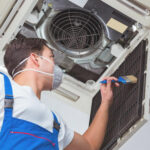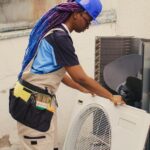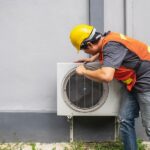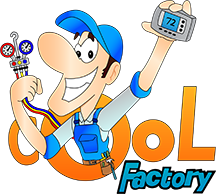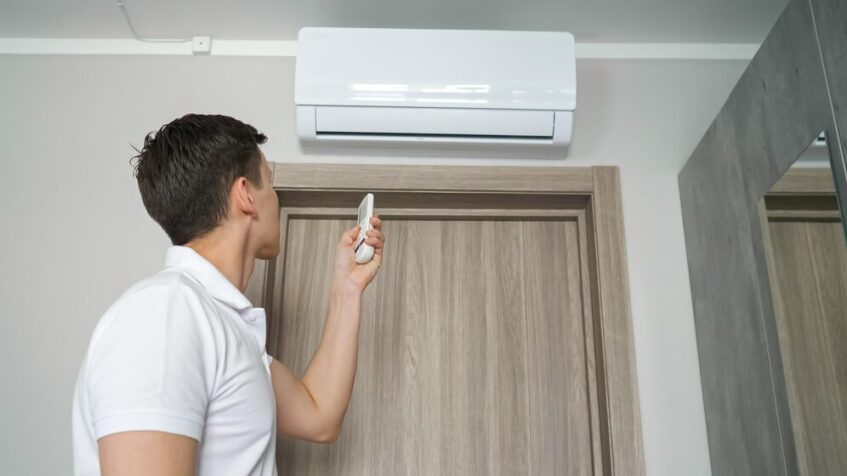
The Ultimate Air Conditioning Guide for Home Comfort
The Ultimate Air Conditioning Guide for Home Comfort
Air conditioning is a vital component of modern living, especially when the scorching heat of summer rolls in. But beyond just providing relief from high temperatures, it’s a cornerstone of home comfort and well-being. In this comprehensive guide, we delve into everything you need to know about air conditioning for your home. From understanding different types of systems to maximizing efficiency and maintaining optimal performance, this resource is your roadmap to achieving the ultimate comfort within your living spaces. Let’s embark on this journey towards a cooler, more comfortable home environment.
Understanding Air Conditioning Basics
Air conditioning systems are essential for creating a comfortable indoor environment, particularly during hot weather. They operate on the principle of refrigeration, where heat and moisture are extracted from indoor air to produce cooler temperatures. This process begins with the unit drawing in warm air from inside the space.
The air then passes over coils containing refrigerant, which absorbs heat and moisture. As a result, the air becomes cooler and drier before being circulated back into the room. This basic understanding empowers homeowners to make informed choices regarding their cooling systems, maintenance routines, and energy-saving practices.
Importance of Home Comfort
Home comfort extends far beyond mere temperature regulation, encompassing elements like air quality, humidity balance, and overall convenience. Particularly during sweltering summer months, a properly functioning air conditioning system becomes pivotal in preserving this comfort. It enables residents to unwind, rest, focus, and relish their time indoors without enduring extreme temperatures.
Emphasizing home comfort not only fosters improved health and productivity but also elevates the overall well-being of household members. Consequently, investing in a dependable air conditioning unit transcends cooling—it becomes an investment in enhancing the quality of life within the home.
Types of Air Conditioning Systems
There are several types of air conditioning systems available, each with its own advantages and ideal applications. These include central air conditioning, ductless mini-split systems, window units, portable air conditioners, and evaporative coolers. Central air conditioning is typically the most common choice for whole-home cooling, while ductless systems offer flexibility for homes without ductwork.
Window units and portable ACs are suitable for smaller spaces or for targeted cooling in specific areas. Evaporative coolers, also known as swamp coolers, are an energy-efficient option in dry climates. Understanding the differences between these systems helps homeowners make informed decisions based on their specific needs and preferences.
Choosing the Right System for Your Home
Selecting the right air conditioning system involves considering various factors such as the size and layout of your home, local climate, budget, energy efficiency, and personal preferences. For example, larger homes may require a central air conditioning system with adequate cooling capacity, while smaller spaces might be better suited for ductless mini-split systems or portable units.
Energy efficiency ratings like SEER (Seasonal Energy Efficiency Ratio) can help homeowners assess long-term operating costs and environmental impact. Consulting with HVAC professionals can also provide valuable insights and recommendations tailored to your unique circumstances, ensuring that you choose the most suitable system for your home.
Maximizing Efficiency: Tips and Tricks
Efficiency is key when it comes to getting the most out of your air conditioning system while minimizing energy consumption and costs. Simple practices like regularly cleaning or replacing air filters can improve airflow and reduce strain on the system. Setting programmable thermostats to adjust temperatures based on occupancy patterns can prevent unnecessary cooling when no one is home.
Proper sealing and insulation of windows, doors, and ductwork help prevent cooled air from escaping and hot air from infiltrating your home. Additionally, scheduling regular maintenance with a qualified technician ensures that your system operates at peak efficiency throughout the year.
The Role of Proper Installation
Proper installation of an air conditioning system is essential for its performance, longevity, and efficiency. It involves precise sizing, placement, and configuration of components to ensure optimal airflow, temperature distribution, and energy efficiency. Improper installation can lead to issues like inadequate cooling, uneven temperature distribution, reduced efficiency, and increased wear and tear on the system.
It may also void manufacturer warranties and result in costly repairs down the line. Hiring a qualified HVAC professional to install your air conditioning system ensures that it is done correctly, adhering to industry standards and best practices for maximum comfort and efficiency in your home.
Maintenance: Keeping Your System Running Smoothly
Regular maintenance is crucial for keeping your air conditioning system running smoothly and efficiently. This includes tasks such as cleaning or replacing air filters, checking and cleaning the evaporator and condenser coils, inspecting and lubricating moving parts, and ensuring proper refrigerant levels.
Additionally, scheduling annual professional inspections and tune-ups can identify and address potential issues before they escalate, prolonging the lifespan of your system and reducing the likelihood of costly repairs. By staying proactive with maintenance, you can enjoy consistent comfort and optimal performance from your air conditioning system year-round.
Troubleshooting Common Issues
Despite regular maintenance, air conditioning systems may encounter occasional issues that require troubleshooting. Common problems include inadequate cooling, uneven airflow, strange noises, foul odors, or system malfunctions. Troubleshooting these issues often involves basic checks such as inspecting air filters, thermostat settings, and circuit breakers, as well as ensuring that vents and registers are unobstructed.
More complex issues may require professional diagnosis and repair, such as refrigerant leaks, compressor problems, or electrical issues. Promptly addressing and resolving these issues helps prevent further damage to your system and ensures continued comfort and efficiency in your home.
Upgrading Your Air Conditioning System
As technology advances, upgrading your air conditioning system can offer numerous benefits in terms of efficiency, comfort, and convenience. Newer systems often feature higher energy efficiency ratings, advanced cooling technologies, and improved air quality control. Upgrading to a newer model can result in lower energy bills, quieter operation, and better overall performance.
Additionally, modern systems may offer enhanced features such as programmable thermostats, variable-speed compressors, and zoning capabilities, allowing for personalized comfort and greater control over your indoor environment. When considering an upgrade, consult with HVAC professionals to assess your options and choose the best system for your home’s needs.
Exploring Smart Home Integration
Smart home integration brings convenience and control to a whole new level by allowing you to manage your air conditioning system remotely through connected devices and voice commands. Smart thermostats, for example, enable you to adjust temperature settings, create schedules, and monitor energy usage from your smartphone or tablet.
Some systems even use artificial intelligence to learn your preferences and automatically optimize settings for maximum comfort and efficiency. Integrating your air conditioning system with smart home platforms like Google Home or Amazon Alexa further enhances convenience, allowing you to control your HVAC system alongside other smart devices in your home with simple voice commands.
Improving Indoor Air Quality
Indoor air quality plays a significant role in the health and comfort of your home environment. Improving it involves various measures such as proper ventilation, air purification, and humidity control. Ventilation systems help remove indoor pollutants by exchanging stale indoor air with fresh outdoor air.
Air purifiers and filters capture airborne particles like dust, pollen, and pet dander, reducing allergens and improving respiratory health. Additionally, maintaining optimal humidity levels prevents mold growth and enhances overall comfort. By implementing these strategies, you can create a healthier and more pleasant living space for you and your family.
Eco-Friendly Cooling Solutions
Eco-friendly cooling solutions prioritize energy efficiency and environmental sustainability while providing effective cooling for your home. Options include high-efficiency air conditioning systems with advanced features like variable-speed compressors and programmable thermostats, which reduce energy consumption and lower carbon emissions.
Additionally, alternative cooling technologies such as evaporative coolers and geothermal heat pumps harness natural resources like water and underground heat to provide cooling with minimal environmental impact. By choosing eco-friendly cooling solutions, you can not only reduce your carbon footprint but also save on energy costs while enjoying a comfortable indoor environment.
Expert Advice for Optimal Home Comfort
Achieving optimal home comfort requires a holistic approach that considers factors such as temperature control, indoor air quality, humidity levels, and energy efficiency. Seeking expert advice from HVAC professionals can provide valuable insights and recommendations tailored to your specific needs and circumstances. These experts can assess your home’s layout, insulation, and existing HVAC system to identify opportunities for improvement.
Whether it’s selecting the right air conditioning system, optimizing airflow and ventilation, or implementing smart home integration, their expertise can help you make informed decisions that enhance comfort, efficiency, and overall well-being in your home.
Ensuring optimal home comfort is a multifaceted endeavor, encompassing aspects beyond mere temperature control. At Cool Factory, Inc., we understand the importance of a well-functioning air conditioning system in achieving this goal. Whether you’re looking to upgrade your current system, explore eco-friendly cooling solutions, or enhance indoor air quality, our team of experts in Sterling, VA, is here to help.
Contact us today at (703) 713-5113 to learn more about how we can tailor our services to meet your specific needs. Let us partner with you in creating a more comfortable and enjoyable living environment for you and your loved ones.



